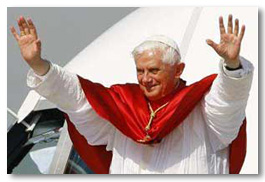Human Rights to Dominate Pope's U.S. visit
- FATHER RAYMOND J. DE SOUZA
It has been said in Rome that the crowds came to see Pope John Paul, but they come to hear Pope Benedict XVI.
 |
When Pope Benedict arrives this afternoon for a sixday visit to the United States, it will be the first opportunity, for many in North America, to test this theory.
As he travels from the nations capital to New York later this week, many in the United States are wondering whether he will be able to match the five superstar visits his predecessor made to America.
That is to misunderstand Benedict and how Benedict understands himself. He is very much the one who comes after he does not seek to imitate his predecessor, nor match either his schedule or his style. To the contrary, Benedict has spoken of his mission as one of confirming and completing the great world-changing pontificate of John Paul.
As Cardinal Joseph Ratzinger, Benedict spent more than 20 years as John Pauls chief theological lieutenant; he was the architect of the major teaching projects of John Paul.
A better contrast is made by those who say that John Paul was the pope for TV he knew how to make the perfect gesture, how to stage the iconic moment.
Benedict instead is a pope for the Internet, a medium still largely driven by words. Benedict makes serious and winsome arguments, making the truths of faith accessible to simple audiences. John Paul lit up the TV screen; Benedicts sermons are downloaded and read again and again.
So what will Benedict say on his U.S. trip?
The centrepiece is his address to the United Nations, on Friday, and here Benedict will highlight this years 60th anniversary of the Universal Declaration of Human Rights.
He will argue that agreement on human rights forms the basis on which different nations and cultures can build a foundation for peace. The great religions of the world have a particular contribution to make to that project, namely, that they provide a conception of the human person on which a secure foundation for human rights can be built.
To that end, Benedict has been challenging Islam precisely on the questions of religious liberty and reciprocal relations that Christians in Muslim lands should have the same rights as Muslims in Christian lands. And Benedict has not forgotten about s t at e s t hat deny human rights, especially religious liberty. The Chinese delegation at the UN will no doubt squirm as the Pope defends those unjustly imprisoned for their faith.
Benedict will take up a deeper question when he addresses the presidents of Catholic universities at the Catholic University of America on Thursday.
How do we arrive at a correct view of the human person, of human rights, of the natural world around us and the supernatural world? How do we relate what we know by our observation and science to the truths revealed by God? Benedicts lifelong project has been to explore the mutually enriching contribution of faith and reason to the knowledge of the truth.
In the university environment where he feels most at home, Benedict will challenge Catholic universities not to betray their mission, to use reason to purify faith of its excesses, and to allow faith to broaden the horizon of reason to examine lifes most fundamental questions.
Benedict comes, of course, as universal pastor of the Catholic Church, which means meeting with other religious leaders, but principally speaking to the Church in the United States. In a meeting with all the U.S. bishops tomorrow, Benedict will speak to them about being pastors of the flock, caring for the sheep and keeping predators at bay.
It is the first papal visit since the sexual-abuse crisis of 2002, and Benedict is expected to address the sins of priests and the complicity of bishops in marring the public witness of the Church. It was as Cardinal Ratzinger in 2005 that he spoke of the filth in the Church, using the image of a ship taking on water from every side, so he is clearly not afraid of using strong language.
But to North American Catholics as a whole, Benedict will speak not of human rights, or geopolitics, or pastoral governance, but of the foundations of the faith trust in God and friendship with Jesus Christ. It should not be forgotten that Benedicts most ambitious project to date has been his book Jesus of Nazareth, presenting the face of Jesus as it emerges from the scriptures, not as a project to study, but as a person to know.
Benedict turns 81 during this visit, likely the only one he will make to the United States. What he does during this momentous visit will bear careful watching and then reading, again and again.
 This is Meaghen Gonzalez, Editor of CERC. I hope you appreciated this piece. We curate these articles especially for believers like you.
This is Meaghen Gonzalez, Editor of CERC. I hope you appreciated this piece. We curate these articles especially for believers like you.
Please show your appreciation by making a $3 donation. CERC is entirely reader supported.

Acknowledgement
Father Raymond J. de Souza, "Human rights to dominate Popes U.S. visit." National Post, (Canada) April 15, 2008.
Reprinted with permission of the National Post and Fr. de Souza.
The Author
Father Raymond J. de Souza is the founding editor of Convivium magazine.
Copyright © 2008 National Post



